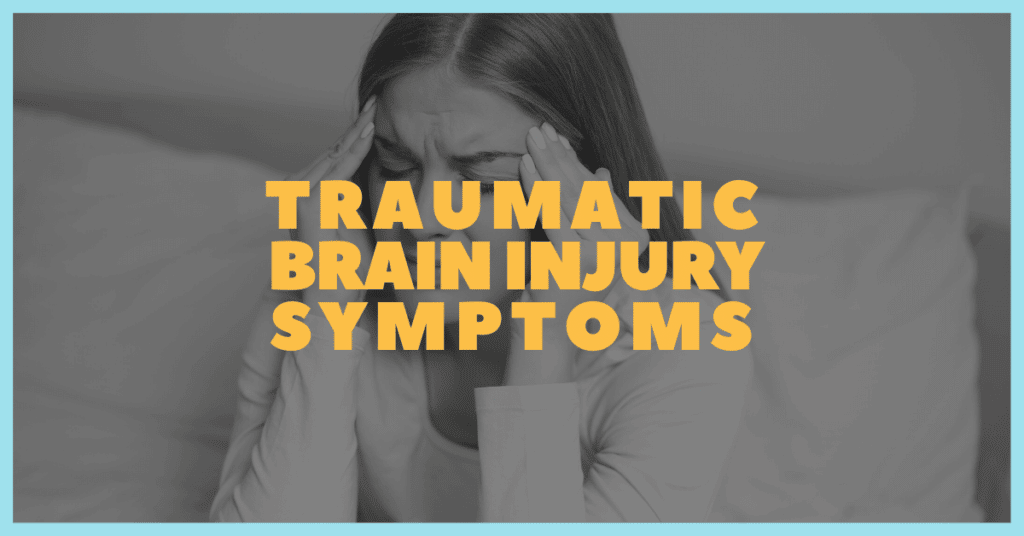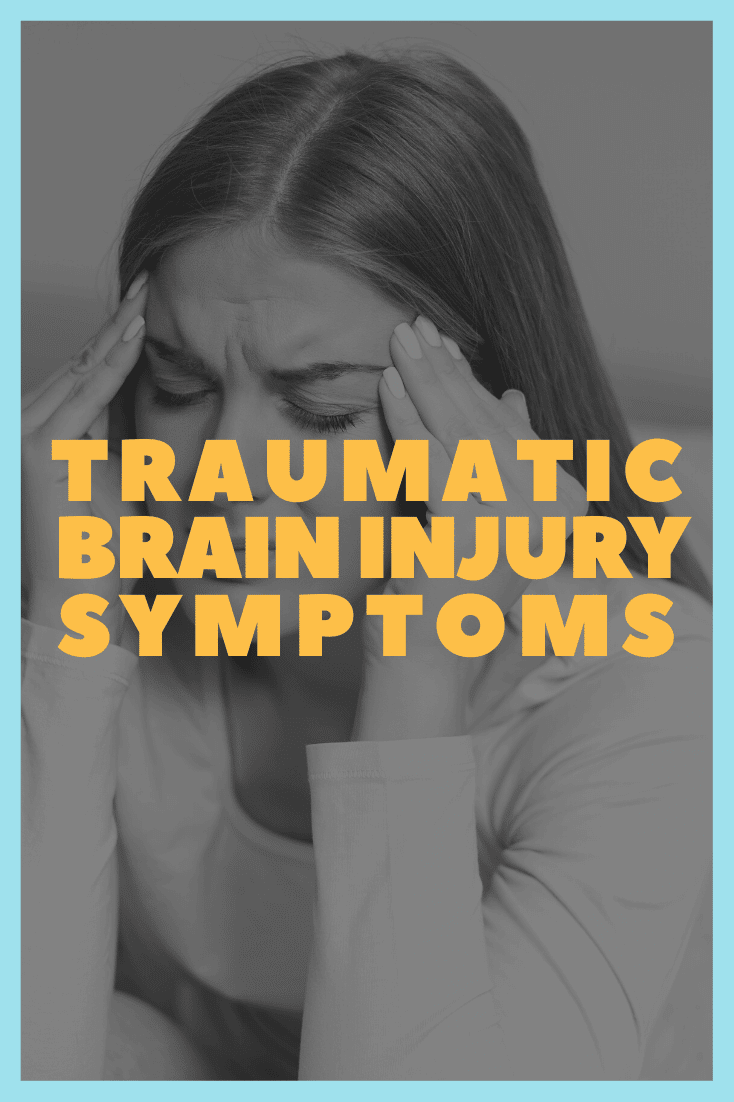Traumatic Brain Injury Symptoms: What You Need To Know

Knowing what traumatic brain injury symptoms to look for after a car crash is important. Although a loss of consciousness or some period of memory loss are often associated with brain injury, it is less well known that a person can suffer a very serious brain injury even without a loss of consciousness or retrograde amnesia.
It is important to remember that the traumatic brain injury symptoms we discuss below are just that: “symptoms.” They are the medical conditions, changes in behavior, changes in physical ability and changes in cognitive functioning that are often seen in car crash victims who suffer a TBI.
No TBI survivor is going to exhibit every one of these TBI symptoms, and not every one of these symptoms is going to present with every brain injury.
Some TBI survivors may only exhibit one or two or a few of these symptoms, but to a more serious degree, whereas others may exhibit many brain injury symptoms.
For example, a person who has suffered a TBI in an automobile crash may or may not lose consciousness, but the absence of a loss of consciousness does not rule out the possibility that the person may in fact suffer a TBI. The medical literature is very clear that people can have serious, even permanent brain injury without a loss of consciousness. Of course, the issue becomes even more complicated with car accidents because many people who do lose consciousness for a period of time are not even aware that they have lost consciousness, and in many crashes the victim may be alone and unobserved in the vehicle for a very long period of time where they did in fact lose consciousness but it was never accurately reported.
It is helpful to think of traumatic brain injury symptoms as the signs that medical professionals who are specialized in treating TBI look for when they are evaluating and assessing a person who has been injured in an auto accident for brain injury.
The absence of a particular symptom does not mean that a TBI did not occur. It does however increase the risk that the TBI will not be properly and timely identified, diagnosed and treated. We are on the verge of many amazing medical breakthroughs in the next several years that will help emergency responders and hospital emergency rooms more accurately diagnose TBI. The possibility of future objective diagnostic testing to help assist clinical correlation and in a close temporal relationship to a traumatic event, such as a car accident, will improve things considerably for victims of TBI.
Trauma, such as a car crash, and the fact that many traumatic brain injury symptoms also closely resemble symptoms for other injuries also contribute to why so many TBIs are so frequently undiagnosed and, thus, go untreated for months or even years. Published studies show that hospital emergency rooms fail to properly diagnose traumatic brain injuries as much as 55-85% of the time.
What are the symptoms of a traumatic brain injury?
If you suffer any of the following symptoms of a traumatic brain injury after an auto accident, seek medical attention immediately: (1) loss of consciousness; (2) loss of memory of events before and after the crash; (3) confusion; (4) difficulty thinking and speaking; (5) headaches; and (6) depression.
Additional symptoms of a traumatic brain injury that car crash victims and their families should be vigilant to watch for include:
- Feeling dazed and/or disoriented
- Feeling drowsy and/or difficult to arouse
- Difficulty making decisions and solving problems
- Difficulty concentrating and paying attention
- Difficulty communicating
- Difficulty with planning and organization
- Word-finding difficulty
- Problem-solving difficulty
- Poor judgment and lack of insight
- Slurred speech
- Blurred vision
- Sensitivity to noise and light
- Nausea or vomiting
- Dizziness
- Balance problems
- Ringing in ears
- Loss of sense of taste and/or smell
- Change in mood
- Decrease in energy levels
- Change in sex drive
- Change in sleep patterns and development of sleep disorders
- Increased aggression
- Movement disorders
- Seizures
Categories of traumatic brain injury symptoms
It is helpful for an automobile crash survivor who has suffered a TBI to know the different categories of traumatic brain injury symptoms: (1) non-neurological symptoms; (2) neurological symptoms; (3) cognitive symptoms; (4) behavioral symptoms; and (5) social symptoms.
Here is more detail about each of the categories of traumatic brain injury symptoms:
- Non-neurological symptoms of TBI – Non-neurological medical complications include pulmonary, metabolic, nutritional, gastrointestinal, musculoskeletal and dermatologic issues.
- Neurological symptoms of TBI – Any sensory, motor and/or autonomic function may be compromised from a TBI. Long-term conditions include a variety of movement disorders, seizures, headaches, visual deficits and sleep disorders.
- Cognitive symptoms of TBI – The most persistent and common cognitive functional problems include: (a) memory impairment; (b) difficulties in concentration as well as deficits in language use and visual perception; (c) problem-solving; (d) abstract reasoning; (e) insight; (f) judgment; (g) planning; and (h) information processing and organization. Cognitive symptoms of TBI can occur individually or in combinations. Their severity and presentation may change over time. Tragically, cognitive symptoms of TBI are also the most frequently overlooked and underdiagnosed of TBI symptoms.
- Behavioral symptoms of TBI – Behavioral deficits include: (a) decreased ability to initiate responses; (b) verbal and physical aggression; (c) agitation; (d) learning difficulties; (e) reduced self-awareness; (f) altered sexual functioning; (g) impulsivity and social dis-inhibition; (h) mood disorders; (i) personality changes; (j) altered emotional control; (k) depression; and (l) anxiety.
- Social symptoms of TBI – Social symptoms of TBI include increased risk of suicide, divorce, chronic unemployment, economic strain and substance abuse. As TBI survivors attempt to resume their daily activities, the environment places increasing demands on them, uncovering additional problems. For example, executive dysfunction may become obvious only in the workplace; behavioral changes affecting relationships may appear after leaving the hospital.
How long after a traumatic brain injury can symptoms occur?
Traumatic brain injury symptoms in an automobile crash victim can occur immediately or – which is most often the case – in the hours, days, weeks or months that follow. The CDC and peer-reviewed medical research explain that these delayed car accident injuries occur because of chemical, inflammatory and structural changes to the brain.
What if someone looks “normal” after a car crash and shows no traumatic brain injury symptoms?
An automobile crash victim can have a TBI even if he or she looks “fine” and is not otherwise exhibiting traumatic brain injury symptoms. This extremely dangerous situation is called the “Talk and Die Syndrome” by doctors and TBI specialists. This does not occur often, but it can be fatal when it does.
What happens is that a car crash victim will sustain a TBI, but because traumatic brain injury symptoms do not immediately become apparent and the victim otherwise looks and seems “okay,” he or she goes on about his or her normal life. Tragically, while that is occurring, the victim’s brain injury worsens, causing greater and greater damage to the person’s brain and cognitive functioning to the point that the victim loses consciousness, suffers permanent brain damage (because the TBI was not properly and timely diagnosed and treated) and/or passes away.
Can these symptoms show up years later?
Generally, brain injury symptoms will not show up years later. Instead, the brain injury was always there, but was initially missed in the emergency room and with early doctor appointments.
Unfortunately, hospital emergency rooms miss TBIs between 55-80% of the time, and many family doctors focus on obvious physical injuries and miss many of the symptoms of brain injury.
In addition, the medical and scientific literature shows that what many medical doctors thought at one point were brain injury symptoms showing up months or years later is really a continuing process where the brain injury evolves and worsens over hours, days, weeks, and even months after a trauma. Doctors have shown that neuroinflammatory and chemical changes in the brains of some people create a metabolic cascade that can mimic traumatic brain injury symptoms “suddenly” showing up months or years after.
Science does not yet have a definitive answer for why some people are so much more susceptible to these evolving and worsening conditions, but genetics and genetic predisposition are strongly suspected.
What about traumatic brain injury symptoms in children?
For children with traumatic brain injury symptoms, the biggest challenge is delays in diagnosis. Children who have suffered a TBI resulting from an auto accident may not yet realize the full consequences until years later when cognitive, behavioral and social symptoms of a TBI begin to interfere with learning and socializing with other kids. Sadly, the effects of a TBI early in a child’s life may not become apparent until years later in the child’s development. Many doctors analogize the issue to a hole in a barrel, and it is not until the water in the barrel rises to a certain level that deficits from a child brain injury become more obvious and apparent.
Get Help Now From A Michigan Brain Injury Lawyer
If you are experiencing traumatic brain injury symptoms after having been involved in a car crash and you have questions about your legal rights to pain and suffering compensation, economic damages and No-Fault benefits to cover medical expenses and lost wages, you can speak to an experienced Michigan brain injury attorney at (800) 968-1001 for a free consultation. You can also get help from an experienced TBI attorney by visiting our contact page or you can use the chat feature on our website.
For more than 50 years, our lawyers have been helping people like you who have suffered a traumatic brain injury in an automobile crash. We understand the physical, emotional and psychological hardships you are experiencing from your accident. We can help.
Michigan Auto Law attorney Steven Gursten has received the highest recorded jury verdicts and settlements for Michigan closed head injury and TBI cases over multiple years, according to year-end compilations of brain injury settlements and trial verdicts by Michigan Lawyers Weekly. These include a $5.65 million verdict on a $1 million dollar settlement offer, a $4.2 million verdict on a $100,000 settlement offer and a $2.5 million trial verdict on a $250,000 settlement offer.
Steve is past-President of the American Association for Justice’s Traumatic Brain Injury Group. Steve is also an in-demand speaker at legal lectures and seminars across the country where he teaches personal injury attorneys how to successfully litigate brain injury cases.
Our law firm consistently wins record-breaking verdicts and settlements in the state on behalf of crash victims who are TBI survivors like you. Significantly, our brain injury attorneys at Michigan Auto Law have also now recovered over 25 separate trial verdicts or judgments of a million dollars or more on insurance company settlement offers of only $0 to $30,000. This trial record allows our brain injury attorneys to settle cases faster and for significantly more money than other personal injury lawyers and law firms who do not have this proven record of success protecting accident victims with mild traumatic brain injury.
Even more important than our record settlements in the state is how our attorneys treat the people we help. To see what our own clients have to say about the caring, compassion, and communication they received from us, you can read in their own words about their experience here on our testimonials page from the crash victims we have helped. You can also read about our 100% client satisfaction guarantee.






